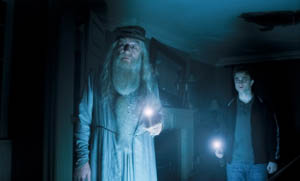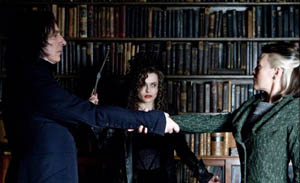|
The Death Eaters are massing, the good and decent members of the wizarding community are afraid, and parents are apprehensive about letting their children return to Hogwarts. Harry Potter balks at this notion: "At Hogwarts, under Dumbledore? Where would we be safer?" Apparently Harry has some sort of memory disorder, and fails to recall how for the past five years, he's faced death at least once, if not multiple times, during the course of the school year. Will this year be any different? In some ways, yes; in others, not really. 
I'm starting to get the impression that there are basically two types of Harry Potter stories: the ones that try to have self-contained story arcs and don't deal with the overarching plot until the end, and the kind which deal only with the overarching story and consequently feel like hang-out movies (eg. Lost in Translation, Dazed and Confused), where clues are slowly accumulated regarding the forthcoming endgame and the rest is character development. Films two and three managed to pull off both, and consequently work the best for me. Films four and five are of the mostly self-contained variety, films one and six are of the hang-out variety. That said, this newest film is far and away better than film one in every respect. Characters we've known for five films previously are easier to hang out with than ones we've just met, and for much of this film, we're essentially going along with our trio of protagonists as they waft through another year. It's comfortable, but often underwhelming. A lot has apparently happened since the events of Order of the Phoenix-I say "apparently," because we don't really see it. A newspaper headline informs us that Lucius Malfoy is awaiting trial, presumably for his part in the events of film five. We never see his arrest or any trial proceedings; I suspect this was detailed in the book and trimmed to its bare minimum for reasons of time constraints. The enemy is marshalling his forces, and Dumbledore is eager to recruit an old friend to his side, one Professor Slughorn, who once taught Voldemort before his descent into evil and who may know more about the Dark Lord than he's let on. Harry meanwhile finds an old, heavily annotated textbook once belonging, according to its back page, to the "Half-Blood Prince," with which he manages to sail to the head of the Potions class, to Hermione's honesty-minded disdain. No one seems to know of any Half-Blood Prince, and Harry seems fine with leaving the riddle unsolved, so long as the book's notations continue to give him an edge. But when a spell culled from his new knowledge nearly kills another student, the fun and games turn dark and foreboding. In the midst of all this, Lucius' brat son Draco has been charged with a sacred task by Lord Voldemort, and Professor Snape swears to assist the boy in any way he can, that the task be carried out. 
Huh? Wha? Did I miss something? Perhaps the powers that be assumed most everyone had read the book already, and would know of this turn of events. Beyond that, I'm rather perplexed. This fact is revealed, quite unceremoniously, very early in the film, in a manner suggesting it should surprise no one. Snape is working for the villains. No shock reveal. It's like Luke Skywalker taking out a family photo and seeing Darth Vader in it. I'm honestly not sure what they were thinking. For the most part, this is one of the Potter films that drifts in seemingly aimless directions and then, in its best moments, accidentally steps in something important while apparently on its way somewhere far more benign. What exactly has Draco been charged to do? We learn about it in reveals of deft prestidigitation, a method the series has used in all its best entries and which constitute its best moments. The flip side is that overall, the series is one comprised overwhelmingly of moments rather than stories as a whole. Moments, and mood. One is most likely to remember the latter in the case of this film, which is far darker in tone than any previous entry. The "comedy relief" ghosts and talking paintings are long gone, and one can't imagine them ever appearing in a film such as this. The cinematography is gorgeous and brooding, the best of all six films (there's a wide shot depicting a confrontation between Snape and Harry on the moonlit grounds outside the school that is absolutely beautiful, for instance). It conveys, better than ever before, that sense of almost numb poise in that last gasp of the pre-storm calm. But the calm is over, and the next film had better be done with it and bring the storm in full. -review by Matt Murray
|
|
||||||||